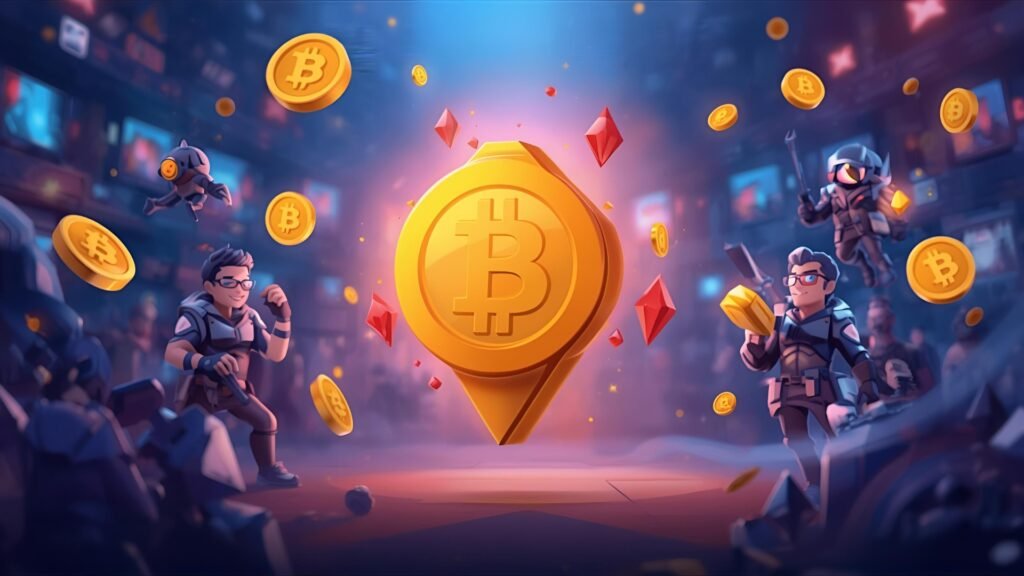The past few years turned play-to-earn mechanics from a quirky experiment into a core on-chain growth strategy. As studios ship new titles and upgrade seasons, crypto gaming token airdrops have become the spark that ignites communities, rewards early testers, and bootstraps player economies. If you are a gamer chasing the next big universe or an investor scouting emerging asset flows, understanding how these distributions work—and how to qualify without burning out is now essential.
This guide is your comprehensive, human-readable playbook to navigate crypto gaming token airdrops in 2025. You will learn why studios airdrop tokens, how snapshots and points systems operate, what on-chain and off-chain activities matter most, and how to balance upside with risk management. We will cover discovery frameworks, practical eligibility tactics, wallet hygiene, sybil resistance trends, and long-term strategies that go beyond a quick claim to build durable value. While excitement around crypto gaming token airdrops can lead to hype and fatigue, a methodical approach—one that treats airdrops as part of a broader game economy—can keep your time, security, and capital working in sync.
By the end of this guide, you will be able to evaluate whether a drop is worth the effort, plan a qualification path that fits your schedule, and make informed decisions about holding, staking, or exiting positions after the claim window opens. Let’s dive in.
Why Studios Use Crypto Gaming Token Airdrops

Crypto gaming token airdrops are not giveaways for their own sake; they are targeted growth tools. Studios use airdrops to align incentives between players, creators, guilds, and investors. Distributing tokens to real users who test builds, provide feedback, and evangelize the game creates sticky communities long before a full launch. Airdrops also seed liquidity for in-game markets, build governance participation, and reward early risk-taking across testnets and closed alphas.
Economically, airdrops convert attention into ownership. Instead of paying exclusively for ads or influencer campaigns, teams hand a portion of the network to the people who power it. This is especially effective in games because every new player adds potential demand for skins, land, resources, and crafting loops—demand that can be amplified when recipients of crypto gaming token airdrops become long-term stakeholders rather than transient speculators.
How Airdrops Typically Work in Gaming
Most crypto gaming token airdrops follow a familiar arc. The studio announces a points or progression program, often tied to quests, play sessions, leaderboard ranks, referrals, or creator content. A snapshot date or rolling window records activity. When the claim portal opens, users connect their wallet, complete verification, and receive their token allocation based on contribution tiers.
Under the hood, allocation formulas often blend several inputs. Core gameplay hours, quest completions, asset ownership, marketplace volume, and social participation might each earn points. Some studios weigh early actions more heavily to reward pioneer risk. Others reward consistency across seasons, particularly when games evolve through iterative chapters on testnets and mainnets. For serious participants, tracking these inputs rather than chasing every shiny announcement is the difference between marginal and meaningful allocations from crypto gaming token airdrops.
The Discovery Framework: Finding Airdrops Before the Crowd
It’s easy to miss opportunities if you only hear about them after the claim window opens. Use a layered discovery framework to surface crypto gaming token airdrops ahead of time.
Track ecosystems rather than individual titles
Start by mapping ecosystems where gaming thrives: modular L2s, sidechains, and app-specific rollups tailored for high-throughput play sessions. When a chain invests in creator grants, infrastructure subsidies, and tournament sponsorships, it tends to cultivate multiple titles. Following ecosystem roadmaps will surface early betas and closed tests that later blossom into crypto gaming token airdrops.
Follow builders and public dev logs.
Many indie studios ship in public, posting weekly updates on features, stress tests, or art drops. Joining Discord servers, reading commit notes, and participating in playtests lets you accumulate credibility that often translates into allocation multipliers. Teams remember the testers who file useful bug reports or show up to replay weekend events, and those consistent contributions frequently lead to stronger crypto gaming token airdrops.
Watch the marketplace and creator tool launch.s
When a studio rolls out a marketplace, crafting system, or map editor, it is signaling a shift toward player-driven economies. Early listings, creator mints, and recipe experiments often feed into airdrop scoring. If you want to be early to crypto gaming token airdrops, be early to the tools that power user-generated content.
Eligibility Tactics That Actually Move the Needle
You do not need to spend all day grinding; you need to spend time where it counts. These tactics consistently matter across crypto gaming token airdrops.
Play loops that demonstrate real engagement.
Quality beats quantity. Completing story arcs, finishing daily quests across multiple weeks, and participating in end-game or ranked modes signals authentic engagement. Studios increasingly discount idle time and bot-like behavior. When you invest in learning the game’s economy, you usually earn better allocations from crypto gaming token airdrops than if you chase minimum thresholds across dozens of titles.
Interact with on-chain features early.
Tokens often reward the first wave of users who craft items, list assets, provide liquidity to in-game DEX pools, or stake governance tokens. If a title introduces a rental system, guild tools, or land-based yield, those mechanics can carry heavy weight in airdrop scoring. Regularly exploring new features soon after they launch positions you for premium crypto gaming token airdrops.
Join community testing moments.
Stress tests, server raids, and bug-bounty playdays provide measurable signals. Studios love verifiable data points, and high-impact test sessions are easy to score. Showing up during those moments compounds across seasons. It’s common to see returning players receive loyalty multipliers in subsequent crypto gaming token airdrops.
Points, Snapshots, and Seasonality

Airdrops evolve through seasons, each with unique scoring and snapshot rules. Understanding seasonality helps you plan commitments.
Points as a universal language
Points systems translate heterogeneous actions into a single metric. While the UI gamifies progress, the key is predictability: can you forecast your allocation range given your weekly habits? If a team publishes a points-to-token curve for its crypto gaming token airdrops, plug in your activity model. Estimate diminishing returns and target the sweet spot where incremental time still earns meaningful tokens.
Snapshots and anti-gaming measures
Snapshot timing is rarely random. Teams often choose windows that catch consistent engagement, not just last-minute sprints. Many now run rolling snapshots or multiple checkpoints. If you plan for crypto gaming token airdrops, cultivate steady participation rather than a single burst. Avoid suspicious patterns like synchronized marketplace flips or sudden asset transfers between wallets; those flags can trigger penalties.
Season resets and loyalty carryover
Season resets refresh meta-progression, but loyalty frequently carries forward. Titles that emphasize narrative continuity and social bonds rarely wipe the slate clean. Instead, they grant bonus multipliers or unique cosmetics that convert into token boosts later. If you aim for multi-season crypto gaming token airdrops, treating a game as a long-term hobby can outperform high-frequency hopping.
Wallet Hygiene and Security for Airdrop Hunters
None of the upside matters if you compromise security. Safe participation is the backbone of sustainable involvement in crypto gaming token airdrops.
Separate hot and cold contexts
Use a dedicated hot wallet for regular play and test deployments. Keep valuable assets and long-term holdings in a cold or hardware context. Signing transactions becomes routine in active games; isolating risk ensures that even if one credential is compromised, your treasury remains intact. This separation is especially prudent when exploring new portals for crypto gaming token airdrops that may later change domains or integrate third-party modules.
Permission management and revocations
As you experiment, you will grant token approvals and operator permissions across marketplaces, bridges, and crafting systems. Review allowances periodically and revoke stale permissions. The habit of quarterly revocations can save you from latent exploits while you pursue crypto gaming token airdrops across multiple chains.
Beware of fake claim sites.
Scammers mimic claim portals right before highly anticipated launches. Bookmark official channels, confirm contract addresses, and avoid social DMs promising priority access. Patience beats panic; a real claim window for crypto gaming token airdrops will remain open long enough to verify details safely.
Evaluating Tokenomics Before You Commit
Not all drops are created equal. Before you invest time, study the underlying token economy.
Supply, emissions, and utility
The token’s total supply, initial float, and emissions schedule determine early price dynamics. Look for clear, practical utility: governance with real stakes, crafting fees, marketplace discounts, seasonal pass conversions, or staking for tournament access. When crypto gaming token airdrops distribute tokens that actually do something, post-claim demand is more resilient.
Sink design and inflation control
Healthy economies design meaningful ways to spend tokens that are fun and voluntary. Crafting rare cosmetics, upgrading land, or unlocking story beats can absorb supply. If a title relies solely on emissions without compelling sinks, crypto gaming token airdrops may deliver short-lived pumps followed by structural sell pressure.
Vesting and cliff dynamics
Team, investor, and ecosystem allocations often vest over time. Early traders sometimes underestimate the effect of future unlocks. If the majority of the circulating supply post-claim is held by engaged players and creators, market depth tends to stabilize, helping crypto gaming token airdrops sustain value beyond the first week.
Hold, Stake, or Exit?
After you claim, the real decisions begin. There is no single correct play; align your strategy with your thesis and risk tolerance.
Holding through feature catalysts
If a title is about to ship ranked seasons, map expansions, or creator competitions, those catalysts can lift demand. Holding tokens from crypto gaming token airdrops into feature releases may capture upside while positioning you for staking or governance rewards tied to milestone participation.
Staking and in-game yield
Some games allow staking to unlock crafting boosts, guild perks, or land tax rebates. Analyze net returns after accounting for lockups. If staking earns unique cosmetics, tournament entries, or governance voting power, holding may compound benefits from your crypto gaming token airdrops in ways that pure price action cannot.
Disciplined exits
Profit is a strategy, not an accident. Scale out in tranches using predefined targets. Avoid round-trip outcomes where paper gains vanish. If you exit, keep a toehold for governance and future seasons; studios often reward returning veterans in subsequent crypto gaming token airdrops.
Avoiding Burnout: The Sustainable Airdrop Routine
Airdrop hunting can become a second job. Sustainable routines keep the fun alive and results consistent.
Focus on three to five core titles.
Pick a cluster of games you actually enjoy. Depth beats breadth in crypto gaming token airdrops because studios increasingly weigh long-term engagement. Rotating between a small set of worlds prevents fatigue while preserving eligibility across seasons.
Weekly review and lightweight tracking
Set aside one session each week to review quests, roadmap updates, and marketplace changes. Maintain a simple log of major actions—boss clears, seasonal ranks, crafting milestones, or creator uploads. This record helps you estimate allocations for upcoming crypto gaming token airdrops without micromanaging every micro-quest.
Community as an efficiency multiplier
Join guilds or creator circles that share playtest calendars, stress test alerts, and build notes. Friendly rivals raise your game literacy, helping you prioritize actions that actually matter in crypto gaming token airdrops rather than low-impact grinds.
Sybil Resistance and Fairness: What to Expect
As prize pools grow, studios tighten defenses against sybil attacks—coordinated sets of fake wallets meant to harvest crypto gaming token airdrops. Expect more identity-light mechanisms that protect privacy while curbing abuse.
Behavior-based scoring
Genuine players exhibit diverse, organic patterns: irregular session lengths, varied crafting choices, social interactions, and iterative progression. Bots and farms repeat deterministic sequences. Games increasingly feed these signals into models that down-weight suspicious activity, improving the fairness of crypto gaming token airdrops for real communities.
Non-transferable badges and soulbound progress
Instead of hard KYC, some titles issue non-transferable badges tied to in-game achievements and creator contributions. These badges boost allocations without exposing personal data, rewarding authentic participation in crypto gaming token airdrops while discouraging identity hopping.
Device and reputation attestation
Lightweight device attestations and cross-game reputation layers are on the rise. If your portfolio of achievements travels with you, studios can confidently reward veterans across new seasons and IPs, making crypto gaming token airdrops both fairer and more strategically targeted.
What Winning Drops Have in Common

While each title is unique, successful crypto gaming token airdrops often share recognizable patterns.
Clear progression and early transparency
Games that publish points systems early and stick to them reduce uncertainty. Players who understand the rules invest more. Transparent weighting for quests, crafting, and competitive modes tends to correlate with stronger communities and healthier post-claim markets for crypto gaming token airdrops.
Meaningful creator economy hooks
When creators can design maps, skins, missions, or narrative arcs, they become long-term stakeholders. Airdrops that reward creator engagement seed vibrant content loops, helping crypto gaming token airdrops translate into recurring demand for tokens and collectibles.
Inclusive, skill-expressive competition
The best drops don’t only reward whales. They reward skill, teamwork, and time reasonably spent. Titles that combine ranked ladders with casual events produce broader participation and smoother token distributions. This inclusivity helps crypto gaming token airdrops avoid concentration and fosters healthier governance.
Fees, Bridges, and Counterparty Exposure
Chasing every opportunity can inflate costs and risk. Smart guardrails protect your bankroll.
Gas budgeting and cost discipline
Batch actions when possible and target low-fee windows. If a quest requires several on-chain steps, estimate the total gas before you begin. A modest allocation from crypto gaming token airdrops can be erased by careless transaction fees across multiple chains.
Bridge prudence
Only bridge assets when strictly necessary. Favor routes with established audits and deep liquidity. Keep bridge exposures short, especially during volatile periods. The marginal boost from qualifying for an additional chain’s crypto gaming token airdrops rarely compensates for compounding bridge risks if you overextend.
Custody caution with third-party platforms
Some programs route participation through partner dashboards or custodial wallets. Treat any custody you do not control as a trade-off. If you must use a managed environment to qualify for crypto gaming token airdrops, limit balances to what is required and withdraw promptly after you complete tasks.
Measuring ROI Beyond the Token Price
A narrow focus on immediate token value can miss the bigger picture. True ROI includes skill development, network effects, and creative output.
Game literacy as compounding capital
The more systems you understand—crafting, marketplaces, guild taxes, tournament formats—the more efficiently you qualify for crypto gaming token airdrops. Literacy compounds because future games reuse mechanics. Each season becomes easier to master and monetize.
Social graph value
Friends and guildmates reduce research time, diffuse risk through shared knowledge, and open doors to closed tests. Your social graph often determines how early you reach new worlds. In the long run, the social halo of crypto gaming token airdrops may eclipse any single token’s price swing.
Creative portfolio flywheel
If you stream, write guides, or design skins, your creative portfolio builds durable leverage. Studios love amplifying creators who teach players and attract newcomers. That visibility can translate into partner allocations or creator-specific crypto gaming token airdrops beyond the public pool.
Building Your 90-Day Plan
Turn theory into practice with a straightforward 90-day plan that respects time and energy.
Days 1–7: Setup and discovery
Establish wallet hygiene, split hot and cold contexts, and write down your security rules. Join core community hubs for three to five promising titles. Read roadmaps and identify quest cycles tied to crypto gaming token airdrops. Create a simple tracker for your actions and gas spend.
Weeks 2–6: Consistent engagement
Play at steady intervals. Prioritize seasonal quests, creator tools, and new on-chain features. Attend at least one stress test per title. Log your efforts and note which actions feel over-weighted in points systems. Adjust your schedule to emphasize those high-impact behaviors for stronger crypto gaming token airdrops.
Weeks 7–12: Optimize and prepare to claim
Revisit tokenomics, catalysts, and vesting calendars. Decide in advance whether you will hold, stake, or exit after claims. Clean up permissions, archive notes, and prep for claim day with verified contract addresses. When claim portals open, move calmly; your preparation ensures you capture your allocation from crypto gaming token airdrops without chaos.
The Future: Interoperable Worlds and Cross-Game Economies
The next wave of crypto gaming token airdrops will emerge from interoperable universes where assets, identities, and reputations travel freely. App-specific rollups, account abstraction, and on-chain credentials will streamline onboarding. As studios collaborate, cross-game quests will knit communities together, rewarding multi-title achievements and guild diplomacy. In that future, airdrops will feel less like isolated events and more like seasonal dividends for participating in a vibrant, interlinked culture of play.
Conclusion
Crypto gaming token airdrops have matured from novelty to cornerstone. When leveraged thoughtfully, they transform players into owners, creators into partners, and time into tangible stakes in a game’s success. The winning approach blends curiosity with discipline: discover titles early, engage where scoring truly matters, protect your security, and think beyond the first price candle. Whether you hold, stake, or rotate, your edge comes from understanding economies as deeply as the worlds you explore. Treat each season as another chapter, and your participation in crypto gaming token airdrops will compound into knowledge, community, and lasting value.
FAQs
Q: What are crypto gaming token airdrops, in simple terms?
A: They are distributions of a game’s native tokens to players, testers, creators, and community members. Studios use them to reward early participation, seed liquidity, and align incentives before or during major releases. By completing quests, testing features, and engaging consistently, you can qualify for allocations from crypto gaming token airdrops.
Q: How can I increase my chances of qualifying for larger allocations?
A: Focus on authentic, consistent play rather than minimal thresholds. Prioritize early interaction with on-chain features like crafting, staking, and marketplaces. Participate in stress tests and creator programs, maintain clean wallet hygiene, and document your progress so you can calibrate effort against expected rewards from crypto gaming token airdrops.
Q: What security steps are essential before claiming an airdrop?
A: Separate hot and cold wallets, review token approvals regularly, and verify official claim portals and contract addresses. Avoid links from unknown DMs and be skeptical of sites promising priority access. Security discipline protects your gains from crypto gaming token airdrops over the long term.
Q: Should I hold, stake, or sell immediately after claiming?
A: It depends on your thesis and the game’s roadmap. If major features, ranked seasons, or creator contests are imminent, holding or staking can compound benefits. If tokenomics suggest near-term sell pressure, scaling out in preplanned tranches is rational. There is no universal rule for crypto gaming token airdrops; make decisions before claim day to avoid impulse trades.
Q: Are airdrops still worth it with higher competition now?
A: Yes, if you are selective and strategic. Chasing every title is inefficient. Instead, concentrate on a few games you enjoy, lean into features that score well, and join communities that surface high-impact opportunities. With a focused routine, crypto gaming token airdrops can remain a rewarding part of your gaming and investment strategy.
Read More: Crypto Rank Airdrop The Ultimate 2025 Guide to Winning Free Tokens


